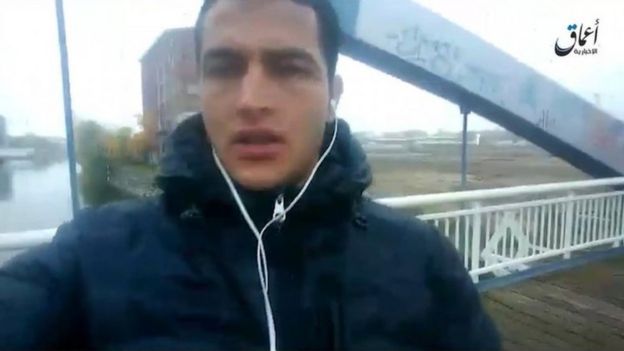His Brief Moment of Terrorist Notoriety
"He was the most wanted man in Europe. There is absolutely no doubt that the person killed is Anis Amri."
Italian Interior Minister Marco Miniti
"It was a regular patrol. They had no perception that it could be him, otherwise they'd have been more careful."
Milan police chief Antonion de Iesu
"We can be relieved at the end of this week that one acute danger has been ended."
"But the danger of terrorism as a whole remains, as it has for many years -- we all know that."
German Chancellor Angela Merkel
"God willing, we will slaughter you like pigs."
"To my brothers everywhere, fight for the sake of Allah. Protect our religion. Everyone can do this in their own way. People who can fight should fight, even in Europe."
"Fear is a reaction, courage is a decision."
Anis Amri, 24, Tunisian Jihadist
 |
|
|
Just as Islamic culture equates honour with the subjugation of women, jihadists equate courage with the decision to mount terrorist attacks upon vulnerable civilian populations with an aim to murder as many as conceivably possible, in honour of Allah. Islam demands of its faithful that they be willingly instrumental in spreading their sacred word of surrender to Islam. Jihad will not be complete until the world turns as one five times daily in Islamic prayer certifying that conquest is achieved.
On the other hand, perhaps it can be conceived that Anis Amri, once his bloody carnage was completed, failed the complete test of heroic courage. To martyr oneself in the course of jihadist action is to complete the process. Since there is honour in the slaughter of non-Muslims to please Allah, self-martyrdom is a requirement, upon which the martyr's ascent to Paradise is assured, when he can reap his promised reward for all eternity with submissive nubile virgins.
Perhaps Islamic clerics will now concern themselves with the scholarly discussions that must now ensue to determine whether this courageous man's actions, culminating in a desperate bid to escape unIslamic justice truly equates with martyrdom, since the concept of the ideological belief in jihad is to sacrifice one's life since, as jihadists are so often fond of claiming, they love death as others love life. Having no fear of death, prepared to clasp it to their bosom, has this man betrayed Islam?
And then other questions arise. Why cannot European intelligence agencies confer with one another and exchange vital information that could protect themselves against such bloody assaults? Authorities admit one time after another that jihadists had come under their surveillance as suspects long before the actual violence ensued. Finding themselves hamstrung with insufficient evidence reflective of Western judicial guidelines to remove the threat.
And this: despite a widespread European threat assessment and warning from various sources then the subsequent alerting of policing and intelligence agencies after the fact, the man who had left more than adequate evidence in his personal papers, his fingerprints, his blood sample at the scene of the crime, was still able to evade authorities in a string of countries including Austria or France or Switzerland. The murderer evaded German authorities, travelled through that country, then Austria and Switzerland, to arrive in Italy.
He was permitted entry to Italy, even though he had a criminal record in both Italy and Tunisia. It was only by chance that a two-man Italian police patrol on the lookout for a robbery suspect, stopped this unkempt-appearing man in the early morning hours at a train station popular with such as he. He had been identified as the prime suspect in the Berlin Christmas market truck ramming, yet Germany couldn't hold him and three other countries couldn't identify him.
This man represented one of the multi-thousand economic migrants who had entered the Italian coast through Lampedusa in 2011 before moving on to Milan; considered a "youth" to whom all opportunities as a Muslim migrant should be extended. He repaid that concern by burning down the refugee holding building he and countless others were sheltered in, over a complaint that the food was not to their liking. His subsequent years in a Milan prison were said to have exposed him to 'radicalization'.
This reflects the circumstances whereby Europe is slowly and steadily being undone.

<< Home